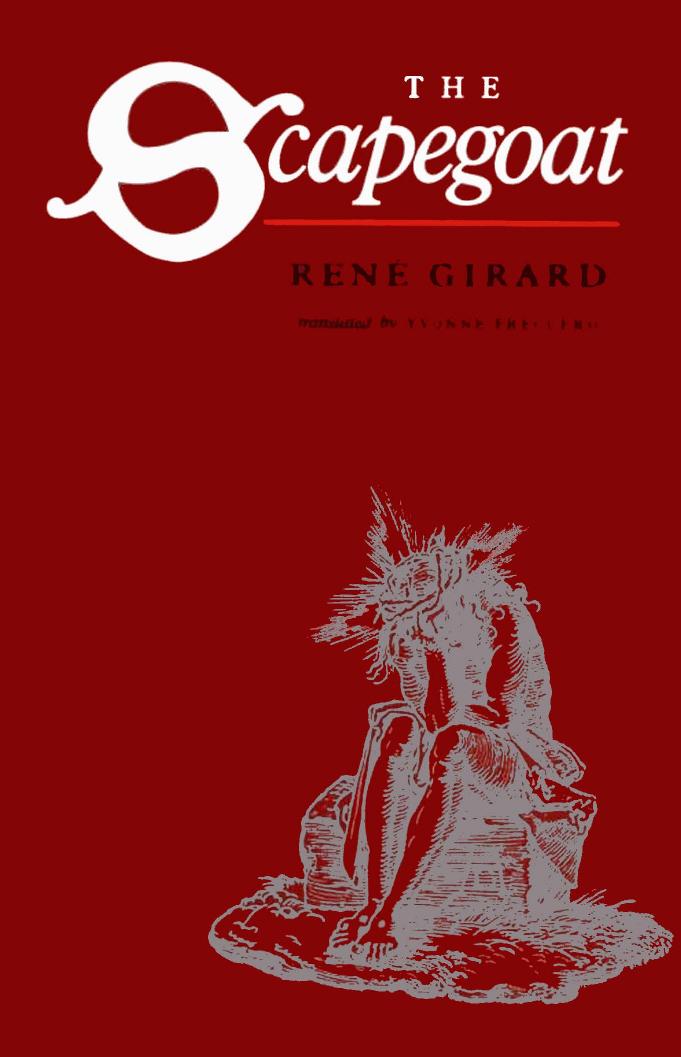The Scapegoat by René Girard

Author:René Girard [Girard, René]
Language: eng
Format: epub, pdf
Tags: Literary Criticism, Semiotics & Theory, Religion, General, Christian Theology, anthropology
ISBN: 9780801839177
Google: uRoAEAAAQBAJ
Publisher: JHU Press
Published: 1989-08-15T23:43:48.145711+00:00
CHAPTER TEN
That Only One Man Should Die
ONLY THE ACTUAL formulation of the process by which a victim pays for others in some way is still missing. The most explicit sentence in this regard in the Gospels is the one that John puts in the mouth of the High Priest Caiaphas during the debate that ends in the decision to put Jesus to death. It articulates unequivocally everything that I have mentioned:
Then the chief priests and Pharisees called a meeting. âHere is this man working all these signs,â they said, âand what action are we taking? If we let him go on in this way everybody will believe in him, and the Romans will come and destroy the Holy Place and our nation.â One of them, Caiaphas, the high priest that year, said, âYou donât seem to have grasped the situation at all; you fail to see that it is better for one man to die for the people, than for the whole nation to be destroyed.â He did not speak in his own person, it was as high priest that he made this prophecy that Jesus was to die for the nationâand not for the nation only, but to gather together in unity the scattered children of God. From that day they were determined to kill him. (John 11:47-53)
The reason for the council is the crisis caused by Jesusâ excessive popularity. But this is but the temporary form of a greater crisis in the entire Jewish society which ends, less than half a century later, in the complete destruction of the state of Israel. The existence of a debate already indicates that a decision is impossible. The indecisive debate reflects the crisis that it endeavors to decide. Because it gets nowhere Caiaphas interrupts somewhat impatiently and abruptly: âYe know nothing at all,â he says. Listening to Caiaphas, all the leaders say: âBut this is true; it is better for one man to perish and for the nation to survive. How come I didnât think of that?â No doubt they had thought of it, but only the boldest of the leaders, the most convinced and decisive, could express the thought explicitly.
Caiaphas is stating the same political reason we have given for the scapegoat: to limit violence as much as possible but to turn to it, if necessary, as a last resort to avoid an even greater violence. Caiaphas is the incarnation of politics at its best, not its worst. No one has ever been a better politician.
There are nevertheless all sorts of risks attached to violence; by taking them on Caiaphas proves himself a leader. The others rely on him. They adopt him as their model; they imitate his serene certainty. Listening to Caiaphas, they no longer doubt. If the entire nation is sure to perish then it obviously would be better for one man to die for all the others, especially since he increases the imminence of the danger by refusing to keep quiet.
Caiaphasâs statement triggers to a certain extent the effect of the scapegoat it defines.
Download
This site does not store any files on its server. We only index and link to content provided by other sites. Please contact the content providers to delete copyright contents if any and email us, we'll remove relevant links or contents immediately.
Zero to IPO: Over $1 Trillion of Actionable Advice from the World's Most Successful Entrepreneurs by Frederic Kerrest(4569)
Machine Learning at Scale with H2O by Gregory Keys | David Whiting(4313)
Never by Ken Follett(3957)
Harry Potter and the Goblet Of Fire by J.K. Rowling(3857)
Ogilvy on Advertising by David Ogilvy(3622)
Shadow of Night by Deborah Harkness(3368)
The Man Who Died Twice by Richard Osman(3079)
Book of Life by Deborah Harkness(2939)
The Tipping Point by Malcolm Gladwell(2922)
Will by Will Smith(2920)
Purple Hibiscus by Chimamanda Ngozi Adichie(2853)
0041152001443424520 .pdf by Unknown(2845)
My Brilliant Friend by Elena Ferrante(2831)
How Proust Can Change Your Life by Alain De Botton(2814)
How to Pay Zero Taxes, 2018 by Jeff A. Schnepper(2655)
Hooked: A Dark, Contemporary Romance (Never After Series) by Emily McIntire(2554)
Rationality by Steven Pinker(2364)
Can't Hurt Me: Master Your Mind and Defy the Odds - Clean Edition by David Goggins(2341)
Borders by unknow(2315)
